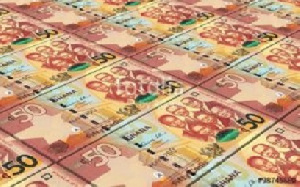The Ghana cedi is projected to decline in value to the US dollar by 8.60% ± 1.50% at the end of 2020.
This will be lower than the 12.9% depreciation to the American currency in 2019.
This means the cedi will hover around GHS6.05 ± GH¢0.10 by 31 December, 2020.
“On account of the anticipated BoG support, partly offset by fiscal risks to the outlook, we obtain our year-end 2020 forecast for USD-GHS interbank rate at GHS6.05 ± GH¢0.10 (FY-2020 Depreciation: 8.60% ± 1.50%)”, investment bank”, Databank 2020 Research revealed.
Outlook
The report pointed out that “We feel assured by the posture of the monetary authorities in maintaining a broadly stable Ghana Cedi in 2020. Our optimism is grounded in the Bank of Ghana’s bi-weekly FX forward auctions which would deepen forward trading and limit spot market pressures.”
The BoG published its FX forward auction calendar for 2020, signaling its plan to inject a cumulative size of US$715 million into the forex forward market in 2020.
The report said: “We note a relatively higher forward auction target of $40 million planned for Quarter One (Q1)-2020 compared to $25 million per auction after Q1-2020. We view the higher-sized allotments for Q1- 2020 as reflecting the Bank of Ghana’s commitment to increase forward activities in Q1-2020 when seasonal pressures tend to shock the spot market.”
It also expected the government’s plan for early issuance of a US$3 billion Eurobond to bolster the Bank of Ghana’s capacity to execute its Foreign Exchange forward auctions.
Besides the forward market interventions, it also expects intermittent forex sales on the spot market to limit short-term volatility.
Review
The Ghana Cedi suffered significant losses in 2019 as investors priced-in the risk of a lax post-IMF policy environment following a raft of unexpected fiscal and monetary policy outcomes.
Key among the unexpected policy developments in 2019 were the 100 basis points cut in the Monetary Policy Rate to 16% in January 2019 as well as the February 2019 interbank forex market directive which increased the minimum tenor for Foreign Exchange swaps between non-resident and resident counterparties to three-months.
The subsequent publications of weaker fiscal and public debt data further dented investor confidence in the policy outlook and intensified the outflow of foreign capital, weighing down the Cedi’s valuation.
Although a US$3 billion Eurobond inflow lifted the Ghana Cedi in March 2019, fundamental fiscal concerns returned to the fore to deepen the Cedi’s full-year 2019 loss to 12.90% on the interbank forex market.
The cedi is presently trading at GHS5.51 on the interbank market but going for about GHS5.81 at the forex bureau.










